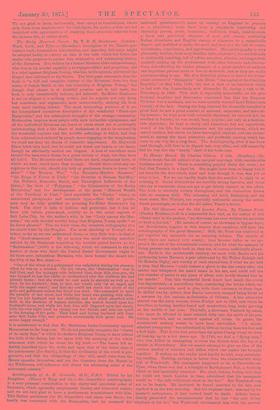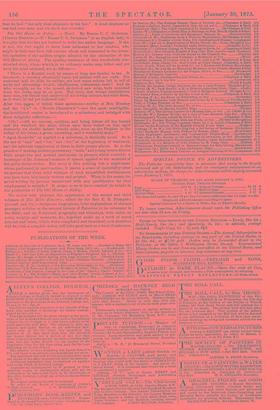The Old Showmen and the Old London Fairs. By Thomas
Frost. (Tinsley Brothers.)—It is a lamentable fact that, as the author of this volume says in his preface, "no showman has ever written his memoirs or kept a journal." (He means, of coarse, no showman in bygone days; our descendants, happier in this respect than ourselves, will have the autobiography of the great Barnum.) Still, Mr. Frost has contrived to get together the materials for an amusing volume. The records of early times are indeed very scanty ; they become fuller as we ap- proach the end of the seventeenth century, and for what the memory of living persons can reach back to, they are, of course, sufficiently abund- ant. Early in the seventeenth century, we meet with Banks and his performing horse Morocco, a pair celebrated by Sir Walter Raleigh and Sir Keneim Digby, and worthy of such chroniclers, if what we are told is true, that Morocco " could restore a glove to the due owner after the master had whispered the man's name in his ear, and could tell the just number of pence in any piece of silver coin newly showed him by his master." Nay, this wonderful horse knew how much the crown was depreciated,—a marvellous feat, considering the tricks which im- poverished monarchs used to play with their currency in those days. So skilful was he, indeed, that Banks narrowly escaped being burnt as a sorcerer by the zealous ecclesiastics of Orleans. A less attractive marvel was the hairy woman, whom Evelyn saw in 1654, and whom he describes as having, besides beard and mustachios, long locks growing on the middle of her nose. This lady, a showman, Vanbeck by name, who must be allowed to have entered fully into the spirit of his pro- fession, married, and so secured against all rivals. In giants, the seventeenth century seems to have been unrivalled. "A much- admired young man" was advertised in 1684 as having been ten foot and a half high. This is two feet more than the great Chang whom we were all looking up to a few years ago. In 1740, we find a " flying man," who was killed in attempting to cross the Severn from the top of a steeple in Shrewsbury. But we cannot attempt to give an idea of the curious medley of wonders and follies which our author has brought together. It makes, as the reader need hardly be told, very entertain- ing reading. Nothing, perhaps, is better than the characteristic story told of Wombwell. His menagerie happened to be at Newcastle-on- Tyne, when there was but a fortnight to Bartholomew Fair, a festivity which he had invariably attended. His rival, Atkins, feeling sure that he could not reach London in time, advertised that his menagerie would bo " the only wild-beast show in the fair." But Wombwell was not to be beaten. He hastened by forced marches to the fair, and reached it on the first morning. But his elephant died ; infected by its master's enthusiasm, it had worked itself to death. Atkins imme- diately placarded the announcement that he had "the only living elephant in the fair," but Wombwell checkmated him with the answer
that he had "the only dead elephant in the fair." A dead elephant no one had ever seen, and his show was crowded.



































 Previous page
Previous page